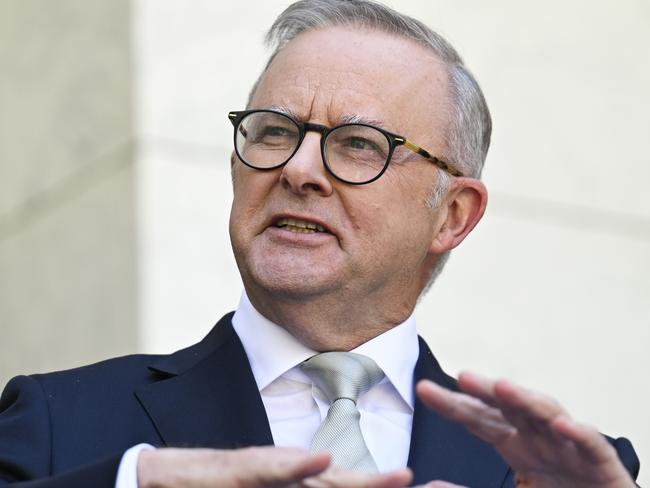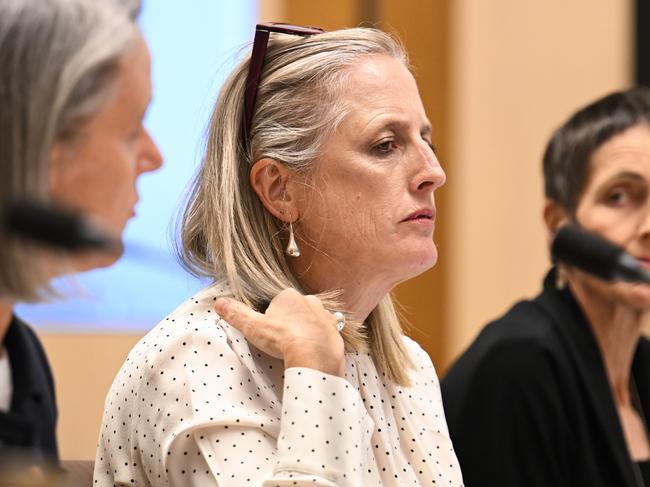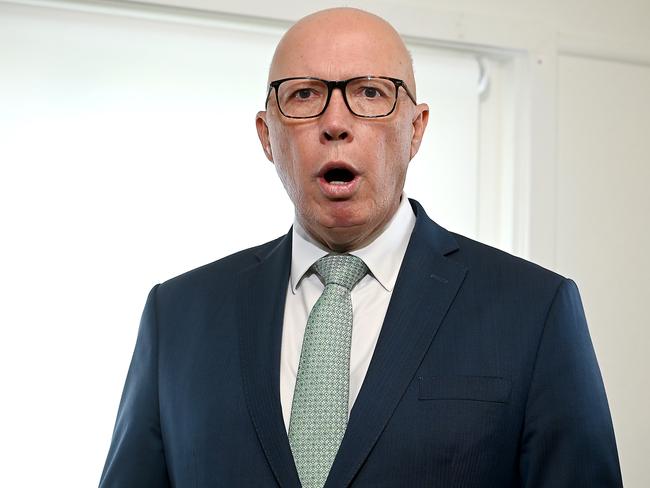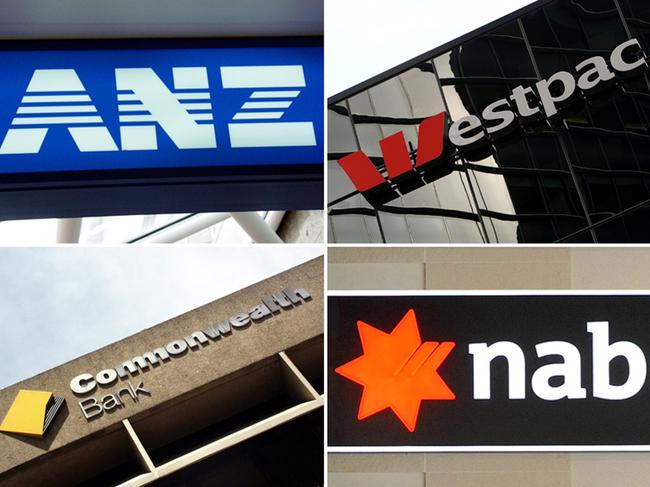Prime Minister fuels ‘insider trading’ allegation against Peter Dutton
Liberal politicians have slammed Labor’s pursuit against Peter Dutton as a “grubby” hit job targeting the man who could be Australia’s next Prime Minister.
National
Don't miss out on the headlines from National. Followed categories will be added to My News.
Anthony Albanese has declared it is up to Peter Dutton to clarify whether or not he engaged in insider trading during the global financial crisis as his Liberal colleagues slammed Labor’s pursuit as a “grubby” hit job targeting the man who could be Australia’s next Prime Minister.
News.com.au revealed on Tuesday that a forensic analysis of Mr Dutton’s declarations to parliament reveals he notified parliament of a share-buying blitz involving the big banks the day before Labor announced a bailout in 2009.
During campaigning in Sydney, Mr Albanese was asked if the Labor Party was seriously suggesting that the Liberal leader engaged in insider trading.
“That’s a matter for Peter Dutton to explain,” the Prime Minister replied.
But Mr Dutton, who is yet to comment publicly on the claims, slammed the allegations via a spokesperson as muckraking accusing Labor’s “dirt unit” of trawling his financial records to create controversy.
“If the Albanese Government’s dirt unit spent more time being focused on fixing Labor’s cost of living crisis rather than obsessing about Peter Dutton, Australians might be better off,’’ a spokesman said.
“Mr Dutton had no access to any sensitive information on these matters, nor was he privy to government briefing on the GFC.”
After the Prime Minister’s intervention calling for Mr Dutton to explain, his office released the following statement.
“Mr Dutton had no access to any sensitive information on these matters, nor was he privy to government briefing on the GFC.”
Between October 2008 and March 2009, Dutton updated his register of interest 13 times to indicate that he had either bought or sold shares.
News.com.au has confirmed he had not previously bought or sold any shares for the previous three years, according to his parliamentary records.

Blow up in Senate estimates
The controversy blew up in Senate estimates with Liberal Senator Jane Hume hurling insults at Finance Minister Katy Gallagher after she raised the issue under the guise of what would happen if a public servant used sensitive information.
“If a public servant was to know that, hypothetically, that the banks were to be bailed out during the GFC and sought to buy up shares of all those major banks on the eve of that announcement, I imagine there would be very, very serious consequences, that we are now reading about how Mr. Dutton behaved,” Senator Gallagher said.
“Do you want to say that outside of parliamentary privilege?,” Liberal Senator Jane Hume interjected.
“Say it outside the room. It’s grubby. You’re so grubby. Say it outside this room.”

Under parliamentary privilege, senators cannot be sued for defamation about what they say in Parliament.
“You are using Coward’s Castle to defame the Liberal leader,” Senator McGrath said.
Senator Gallagher then tartly observed that “apparently it was just a coincidence.”
“It’s just a coincidence was it? That a lot of shares were bought the day before a bank bailout? A happy coincidence,” Senator Gallagher responded.
“He has genuine questions to answer.”
Timelines under the microscope
The Labor Party asserts that some of the share-trading buy-ups occurred shortly before the Rudd-Gillard Government announced big bailouts for the banks, spiking share prices.
On January 23, 2009 Dutton declared that he had bought Commonwealth Bank, National Australia Bank and Westpac shares.
On that date, all three companies experienced record-low share prices.
On Saturday, January 24 2009, the Rudd Government announced the Australian Business Investment Partnership, a $4 billion in stimulus package to the commercial property market to be delivered in partnership with Australia’s major banks.
The ABIP never went ahead as it was opposed by the Coalition, but the announcement made waves at the time.
Following this announcement, Commonwealth Bank shares rose from $23.94 at the close of trading on January 23 to a high of $29.11 on the day Dutton declared that he had sold Commonwealth Bank shares – a 21.6 per cent rise in twelve days.

It’s not known if Mr Dutton bought the shares on January 23 or the day or prior but he did update his register multiple times during this period with individual share purchases. Under the rules, he must update the register within 30 days.
As a result, the Albanese Government wants the Liberal leader to reveal if he was briefed on the government’s plan through his role on the Coalition front bench at the time or via third parties.
While Mr Dutton was in opposition at the time, the Labor Government was regularly briefing the opposition leader Malcolm Turnbull on major stimulus packages, prompting Labor questions about what he knew when he bought the shares.
Labor says Peter Dutton has questions to answer
“Peter Dutton has questions to answer about his highly unusual share trading during the GFC,’’ Employment Minister Murray Watt said.
“Why did he make these trades at critical times the government was protecting Australian banks?
“Did he have access to sensitive information not available to the Australian public?
“Mr Dutton must reveal all records including the dates and times he made these share purchases and whether he received briefings or sensitive information on banking support.
“When the Australian people were going through incredible uncertainty and anxiety, Peter Dutton was playing the stock market.
Why January 23, 2009 was a big day
While the timeliness of Mr Dutton’s declaration to parliament is not in question, what Labor wants to know is whether or not Mr Dutton was aware when he bought the shares that the government planned to make billion-dollar investments that would increase the value of the shares.
For example, on January 23 2009 Dutton declared that he had bought Commonwealth Bank, National Australia Bank and Westpac shares.
That date was an extraordinary day as all three companies experienced record low share prices.

Then, on Saturday, January 24 2009, the Rudd Government announced the Australian Business Investment Partnership, a $4 billion in stimulus package to the commercial property market, to be delivered in partnership with Australia’s major banks.
Following this announcement, Commonwealth Bank shares rose from $23.94 at the close of trading on January 23 to a high of $29.11 on the day Dutton declared that he had sold Commonwealth Bank shares – a 21.6 per cent rise in twelve days.
Malcolm Turnbull was briefed on the stimulus package
In an interview with Alan Jones on February 6 2009, then-Opposition Leader Malcolm Turnbull claimed that the Opposition was given a Treasury briefing on the stimulus package at 12pm on February 3 2009, two and a half hours before Rudd announced it in the House of Representatives.
“Well we were given it at 12 noon, we got a fairly cursory briefing from the Treasury and then the Government were saying; ‘you must agree to it right now,’’ Mr Turnbull said.
Mr Turnbull also referred to the briefing in parliament. It is not known who attended the briefing and it is not suggested that Mr Dutton was present given he no longer held the finance portfolio.
“It is an insult to this parliament and to the Australian people to have the Prime Minister present the opposition with a $42 billion spending package that takes the budget for this very year from a $22 billion surplus into a $22 billion deficit in nine months,’’ he said.
“This program of so much spending, of such great scale, moment and importance was presented to us at 12 o’clock with a briefing where basic questions could not be answered by some of the officials present. Those officials said, ‘We will get back to you’ — and that is good; I have no doubt that they will.”
Mr Dutton ultimately sold most of the shares, although he held onto shares in ANZ, BHP and Qantas until December 2012.
Originally published as Prime Minister fuels ‘insider trading’ allegation against Peter Dutton



